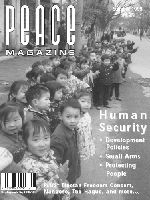
Peace Magazine Summer 1999, page 30. Some rights reserved.
Search for other articles by PMag staff here
On August 17-18, a spacecraft is expected to pass about 729 miles from Earth over the eastern south Pacific, then swing around the planet and hurtle out into space. This is the Cassini Mission to Saturn, a joint project of NASA, the European Space Agency, and the Italian Space Agency. Costing around $3.4 billion, the vehicle was launched in October 1997 on a Titan rocket and is the second largest interplanetary spacecraft ever sent to space. Its journey will last about seven years before reaching the gas planet Saturn, which it will then examine. It carries the Huygens Probe, a cone that will enter the atmosphere of the moon Titan, to land and send scientific information back to earth.
The project is fiercely opposed by environmentalists, mainly because of the way in which the craft is designed to gather speed for its long journey. It will fly twice around Venus and once around Earth, much as a slingshot gains momentum by being swung. It carries 72 pounds of plutonium, which will be used to augment its solar fuel source. At the time when it swings around Earth, it will pass through the Perseid meteor shower, where there is some possibility of its being hit by one of the small meteoroids. Since it will be traveling at great speed, a tiny meteor might knock the spaceship off course. Though NASA claims that the odds of disaster are one in a million, should that happen, the impact might send Cassini into the earth's atomsphere, where the deadly plutonium would be scattered, primarily as tiny particles that could be inhaled. These radioactive particles would be around for centuries, causing cancers among the human inhabitants of Earth, and also mutations among all other species, including plants. Fortunately, ground control will have contact with the craft during much of the crucial period and may be able to intervene the prevent this catastrophic outcome.
Nevertheless, some scientists argue that the risks of disaster are much higher than the one-in-a-million odds estimated by NASA. For one thing, the Titan rockets have an unimpressive record. Although the scientific information to be yielded will be useful, in no way can it be considered useful enough to jeopardize the future of all life on the planet.
Politically, our challenge is to establish means by which all of humankind can authorize - or refuse to authorize - any project that jeopardizes the future of life on the planet. Add this issue to your already full agenda.
Turkey, which ranked third among major recipients of weapons between 1994 and 1998, is undertaking one of the most ambitious military modernization programs in the post-Cold War era. This $150 billion program will modernize its forces over 25 to 30 years. The main staples of its plans are the purchase of 145 attack helicopters and 1,000 main battle tanks.
Arms purchases by Turkey tend to be highly politicized. Because of Ankara's dubious human rights record, exporters in some countries face domestic opposition to selling arms to Turkey. The U.S. Department of State issued detailed criteria for granting an export license for U.S. attack helicopters to Turkey. It requires that Ankara release journalists and parliamentarians from prison and end torture before the helicopters can be sold. However, as one of the largest customers on the arms market, Turkey is in a position to influence export policies by simply threatening to withhold the order or to award it to another producer. In May a member of the Turkish General Staff, Gen Batmaz Dandin, warned that Turkey may shift its business away from the U.S.A.
Tomas Valasek, Research Analyst, Center for Defense Information, Washington.
A few countries are taking active steps to prevent continued armed violence in their countries. Brazil, which is plagued with 27,000 deaths per year by small arms - 10 to 13% of all gun-related deaths in the world - is beginning such action. The Assembly of Deputies approved a law banning the commerce of small arms in the state of Rio by a vote of 41-10 on June 1. Only the armed forces, police, and private security firms will be permitted to buy guns. The City Hall of Rio de Janeiro city has approved a similar law and President Fernando Henrique Cardoso proposes to ban trade in small arms throughout Brazil.
Rachel Stohl,Center for Defense Information.
Justice D. Michael Goldie will conduct hearings into the planned expropriation of Nanoose Bay test range from July 19-30 and in Vancouver from August 3-13. He will hear up to 2600 objectors and submit a report by September 4 to Defence Minister Art Eggleton. To register call registrar at 604/631-3138.

Peace Magazine Summer 1999, page 30. Some rights reserved.
Search for other articles by PMag staff here